-
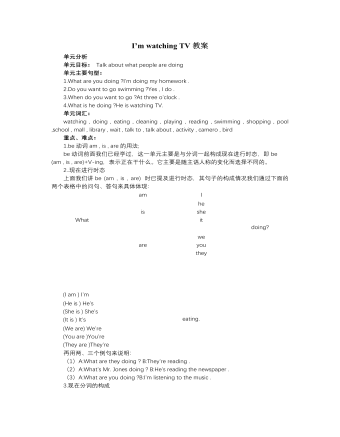
人教版新目标初中英语七年级下册I’m watching TV教案
单元分析单元目标: Talk about what people are doing 单元主要句型:1.What are you doing ?I’m doing my homework .2.Do you want to go swimming ?Yes , I do .3.When do you want to go ?At three o’clock .4.What is he doing ?He is watching TV. 单元词汇:watching , doing , eating , cleaning , playing , reading , swimming , shopping , pool ,school , mall , library , wait , talk to , talk about , activity , camero , bird 重点、难点:1.be动词am , is , are的用法;be动词前面我们已经学过,这一单元主要是与分词一起构成现在进行时态,即be (am , is , are)+V-ing,表示正在干什么。它主要是随主语人称的变化而选择不同的。2..现在进行时态上面我们讲be (am , is , are) 时已提及进行时态,其句子的构成情况我们通过下面的两个表格中的问句、答句来具体体现:3.现在分词的构成现在进行时态中be + V - ing 的构成中V-ing被称为现在分词,它的基本构成是动词原形+ing,但也有些特殊情况,下面分几类说明:(1)一般情况+ing如:read→reading,go→going,do→doing,look→looking,listen→listening,watch→watching.(2)以不发音的e结尾的词,去掉e,再加ing.如:write→writing,skate→skating,type→typing,wake→waking,make→making
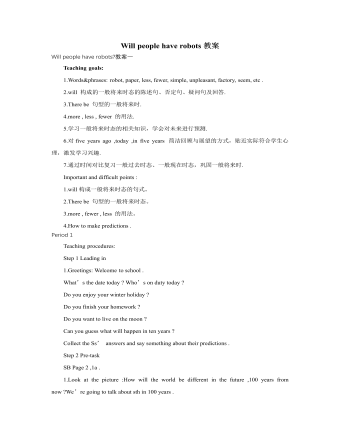
人教版新目标初中英语八年级下册Will people have robots教案
Teaching goals:1.Words&phrases: robot, paper, less, fewer, simple, unpleasant, factory, seem, etc .2.will 构成的一般将来时态的陈述句、否定句、疑问句及回答.3.There be 句型的一般将来时.4.more , less , fewer 的用法.5.学习一般将来时态的相关知识,学会对未来进行预测.6.对five years ago ,today ,in five years 简洁回顾与展望的方式,贴近实际符合学生心理,激发学习兴趣.7.通过时间对比复习一般过去时态、一般现在时态,巩固一般将来时.Important and difficult points :1.will构成一般将来时态的句式。2.There be 句型的一般将来时态。3.more , fewer , less 的用法。4.How to make predictions .Period 1Teaching procedures:Step 1 Leading in1.Greetings: Welcome to school .What’s the date today ? Who’s on duty today ?Do you enjoy your winter holiday ?Do you finish your homework ?Do you want to live on the moon ?Can you guess what will happen in ten years ?Collect the Ss’ answers and say something about their predictions .Step 2 Pre-taskSB Page 2 ,1a .1.Look at the picture :How will the world be different in the future ,100 years from now ?We’re going to talk about sth in 100 years .
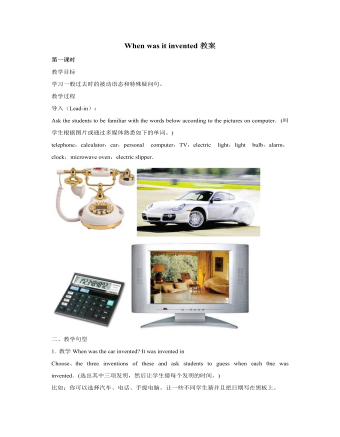
人教版新目标初中英语九年级下册When was it invented教案
二、教学 1a,1b.1.First the teacher asks the students what kind of fruit food and drink you like the best and writes down on the blackboard.教师问学生最喜欢什么水果和饮料并把它们写在黑板上。比如:potato chips,ice cream,tea,lemon,chocolate,oranges,salad,popcorn,pickle and so on.2.接着叫学生表达以上食物的味道,引出新单词——sweet,crispy,salty,sour,delicious,hot,awful,nice…并且完成lb教学内容通过此活动,以旧带新引入新单词。其目的是让学生自主学习新知识。 三、教学 2a,2b1.首先,听力前的brainstormFirst,Let students describe how potato chips taste and describe how helpful the potato chips.Then,ask:When and where were potato chips invented?Who were potato chips invented by?How were potato chips invented?(Let students guess according to the following key words.)Key words:by accident,customer,restaurant,by mistake.(说明:通过问题让学生对对话内容有整体了解,为听力练习做好准备;又培养学生的注意力,想像力,观察力。)
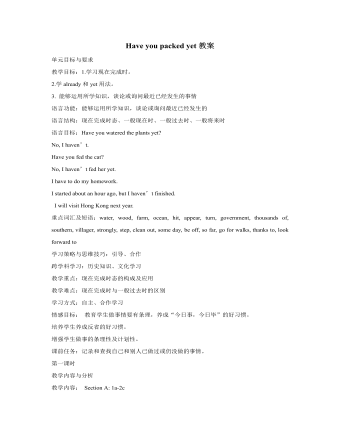
人教版新目标初中英语九年级下册Have you packed yet教案
教学目标:1.学习现在完成时。2.学already和yet用法。3. 能够运用所学知识,谈论或询问最近已经发生的事情语言功能:能够运用所学知识,谈论或询问最近已经发生的语言结构:现在完成时态、一般现在时、一般过去时、一般将来时语言目标:Have you watered the plants yet?No, I haven’t.Have you fed the cat?No, I haven’t fed her yet.I have to do my homework. I started about an hour ago, but I haven’t finished. I will visit Hong Kong next year.重点词汇及短语:water, wood, farm, ocean, hit, appear, turn, government, thousands of, southern, villager, strongly, step, clean out, some day, be off, so far, go for walks, thanks to, look forward to学习策略与思维技巧:引导、合作跨学科学习:历史知识、文化学习教学重点:现在完成时态的构成及应用教学难点:现在完成时与一般过去时的区别 学习方式:自主、合作学习 情感目标: 教育学生做事情要有条理,养成“今日事,今日毕”的好习惯。培养学生养成反省的好习惯。增强学生做事的条理性及计划性。课前任务:记录和查找自己和别人已做过或仍没做的事情。
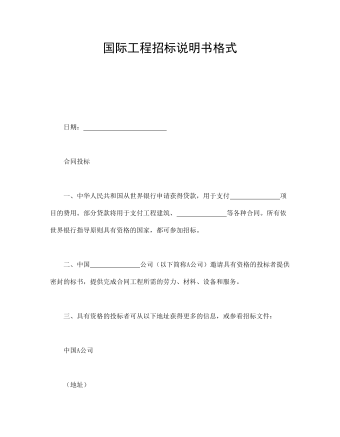
国际工程招标说明书格式
一、中华人民共和国从世界银行申请获得贷款,用于支付 项目的费用。部分贷款将用于支付工程建筑、 等各种合同。所有依世界银行指导原则具有资格的国家,都可参加招标。二、中国 公司(以下简称A公司)邀请具有资格的投标者提供密封的标书,提供完成合同工程所需的劳力、材料、设备和服务。三、具有资格的投标者可从以下地址获得更多的信息,或参看招标文件:中国A公司(地址)四、第一位具有资格的投标者在交纳 美元(或人民币),并提交书面申请后,均可从上述地址获得招标文件。五、每一份标书都要附一份投标保证书,且应不迟于 (时间)提交给A公司。六、所有标书将在 (时间)当着投标者代表的面开标。七、如果具有资格的国外投标者希望与一位中国国内的承包人组建合资公司,需在投标截止日期前30天提出要求。业主有权决定是否同意选定的国内承包人。八、标前会议将在 (时间) (地址)召开。投标者须知一、工程概述(根据具体情况写)二、资金来源
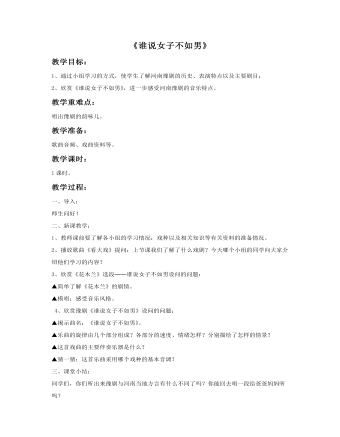
《谁说女子不如男》教案
教学过程: 一、导入:师生问好!二、新课教学:1、教师课前要了解各小组的学习情况:戏种以及相关知识等有关资料的准备情况。2、播放歌曲《看大戏》提问:上节课我们了解了什么戏剧?今天哪个小组的同学向大家介绍他们学习的内容? 3、欣赏《花木兰》选段──谁说女子不如男设问的问题:▲简单了解《花木兰》的剧情。▲模唱:感受音乐风格。 4、欣赏豫剧《谁说女子不如男》设问的问题:▲揭示曲名:《谁说女子不如男》。▲乐曲的旋律由几个部分组成?各部分的速度、情绪怎样?分别描绘了怎样的情景?▲这首戏曲的主要伴奏乐器是什么?▲猜一猜:这首乐曲采用哪个戏种的基本音调?
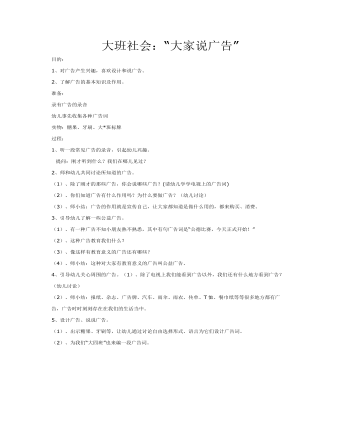
大班社会教案:大家说广告
2、了解广告的基本知识及作用。准备:录有广告的录音幼儿事先收集各种广告词实物:糖果、牙刷、大*班标牌过程:1、听一段常见广告的录音,引起幼儿兴趣。 提问:刚才听到什么?我们在哪儿见过?2、师和幼儿共同讨论所知道的广告。(1)、除了刚才的那些广告,你会说哪些广告?(请幼儿学学电视上的广告词)(2)、你们知道广告有什么作用吗?为什么要做广告?(幼儿讨论)(3)、师小结:广告的作用就是宣传自己,让大家都知道是做什么用的,都来购买、消费。
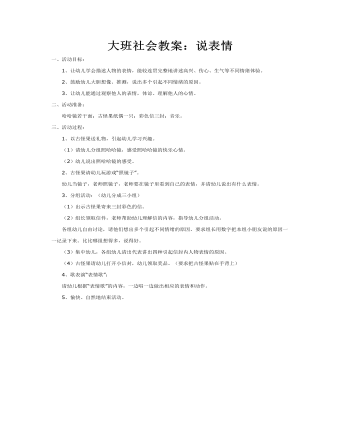
大班社会教案:说表情
二、活动准备: 哈哈镜若干面;古怪果纸偶一只;彩色信三封;音乐。三、活动过程:1、以古怪果送礼物,引起幼儿学习兴趣。 (1)请幼儿分组照哈哈镜,感受照哈哈镜的快乐心情。 (2)幼儿说出照哈哈镜的感受。2、古怪果请幼儿玩游戏“照镜子”。 幼儿当镜子,老师照镜子,老师要在镜子里看到自己的表情,并请幼儿说出有什么表情。3、分组活动:(幼儿分成三小组) (1)出示古怪果寄来三封彩色的信。
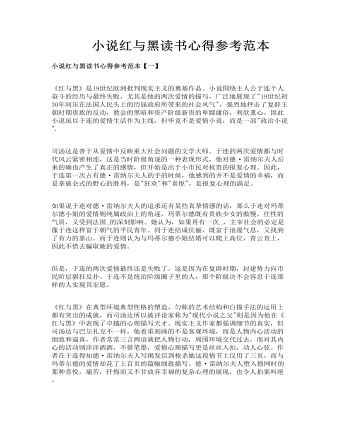
小说红与黑读书心得参考范本
司汤达是善于从爱情中反映重大社会问题的文学大师。于连的两次爱情都与时代风云紧密相连,这是当时阶级角逐的一种表现形式,他对德·雷纳尔夫人后来的确也产生了真正的感情,但开始是出于小市民对权贵的报复心理。因此,于连第一次占有德·雷纳尔夫人的手的时候,他感到的并不是爱情的幸福,而是拿破仑式的野心的胜利,是"狂欢"和"喜悦",是报复心理的满足。 如果说于连对德·雷纳尔夫人的追求还有某些真挚情感的话,那么于连对玛蒂尔德小姐的爱情则纯属政治上的角逐,玛蒂尔德既有贵族少女的傲慢,任性的气质,又受到法国_的深刻影响。她认为,如果再有一次_,主宰社会的必定是像于连这样富于朝气的平民青年。同于连结成伉俪,既富于浪漫气息,又找到了有力的靠山。而于连则认为与玛蒂尔德小姐结婚可以爬上高位,青云直上,因此不惜去骗取她的爱情。
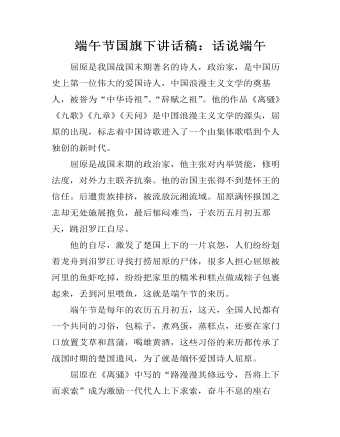
端午节国旗下讲话稿:话说端午
屈原是我国战国末期著名的诗人,政治家,是中国历史上第一位伟大的爱国诗人,中国浪漫主义文学的奠基人,被誉为“中华诗祖”、“辞赋之祖”。他的作品《离骚》《九歌》《九章》《天问》是中国浪漫主义文学的源头,屈原的出现,标志着中国诗歌进入了一个由集体歌唱到个人独创的新时代。屈原是战国末期的政治家,他主张对内举贤能,修明法度,对外力主联齐抗秦。他的治国主张得不到楚怀王的信任。后遭贵族排挤,被流放沅湘流域。屈原满怀报国之志却无处施展抱负,最后郁闷难当,于农历五月初五那天,跳汨罗江自尽。他的自尽,激发了楚国上下的一片哀怨,人们纷纷划着龙舟到汨罗江寻找打捞屈原的尸体,很多人担心屈原被河里的鱼虾吃掉,纷纷把家里的糯米和糕点做成粽子包裹起来,丢到河里喂鱼,这就是端午节的来历。
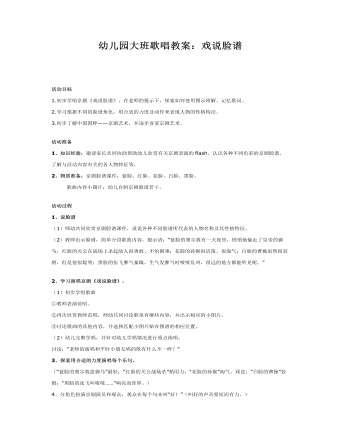
幼儿园大班歌唱教案:戏说脸谱
2.学习根据不同的脸谱角色,用合适的力度及动作来表现人物的性格特征。 3.初步了解中国国粹——京剧艺术,并逐步喜爱京剧艺术。活动准备 1、知识经验:邀请家长共同协助帮助幼儿欣赏有关京剧表演的flash、认识各种不同色彩的京剧脸谱、了解与活动内容有关的各人物特征等, 2、物质准备:京剧脸谱课件:蓝脸、红脸、花脸、白脸、黑脸。 歌曲内容小图片;幼儿自制京剧脸谱若干。 活动过程 1、说脸谱 (1)师幼共同欣赏京剧脸谱课件,说说各种不同脸谱所代表的人物名称及其性格特征。
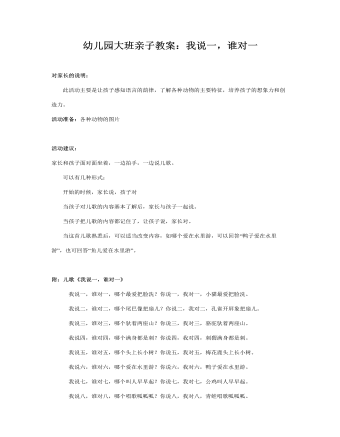
幼儿园大班亲子教案:我说一,谁对一
活动准备:各种动物的图片 活动建议:家长和孩子面对面坐着,一边拍手,一边说儿歌。 可以有几种形式: 开始的时候,家长说,孩子对 当孩子对儿歌的内容基本了解后,家长与孩子一起说。 当孩子把儿歌的内容都记住了,让孩子说,家长对。 当这首儿歌熟悉后,可以适当改变内容,如哪个爱在水里游,可以回答“鸭子爱在水里游”,也可回答“鱼儿爱在水里游”。
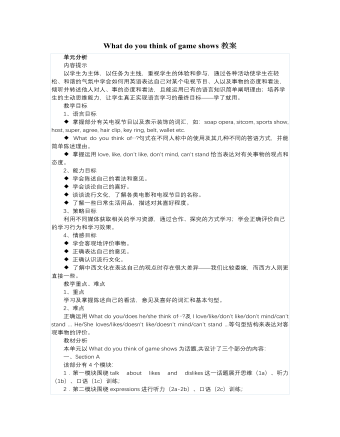
人教版新目标初中英语七年级下册What do you think of game shows教案
五、教学Section B-2c1. Pair work: What do you think of the belt/sunglasses/…? What does your father/mother/… think of your scarf/belt…?2. Group work(1). Teacher shows some different kinds of school uniforms (制服)and asks : “ What do you think of your school uniforms? If you have a chance to choose your school uniforms, what kind would you like to choose?”(2). Discuss in groups.(3).Get some Ss to report in class.说明:这一步旨在让学生运用已有的语言知识谈论对事物的看法和意见,并简单阐明理由,培养学生的主动思维能力和运用英语的能力。六、教学拓展调查电视节目的收视率任务:调查你周围的人对现在各种电视节目的反响。活动过程:1.教师布置任务,让学生调查周围的人(包括他的亲戚朋友和邻居)喜欢收看哪方面的电视节目。2.学生进行调查活动,运用本单元所学的句型What do you think of….? (Why?)What's your favorite game shows?What do you think of talk show?I doesn’t mind it.I like it.I love it.I can’t stand it.3.记录下排在前10位的TV Program,填写调查表,比较其收视率。
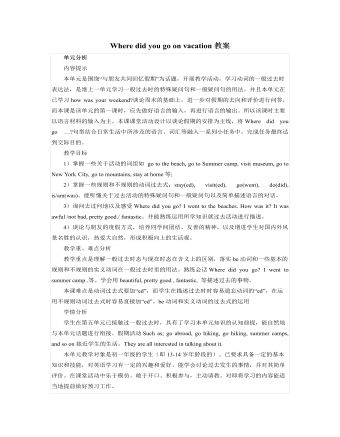
人教版新目标初中英语七年级下册Where did you go on vacation教案
句型: Where did you go on vacation? I went to summer camp.Did she go to Central Park?Yes,she did.No, she didn’t语法:一般过去时特殊疑问句、一般疑问句及肯、否定回答。课时安排4课时第一课时:Section A:la,1b,lc,2a,2b,2c 第二课时:Section A:3a,3b,4第三课时:Section B:1,2a,2b,2c第四课时:Section B:3a,3b,3c,4 and Self Check第一课时教学目标掌握描写假期生活的形容词。假期里自己所做事情的简单表达。谈论假期做的事情及当时情况。谈论假期时旅游的天气,旅游者以及食物等。教学过程一、导入播放一首英文歌曲:Let’s travel 说明:通过让学生听节奏欢快迪斯尼英语歌曲Let’s travel.引入本节课谈论的话题vacation and travel. 让歌曲使学生的思维活跃,增强课堂气氛,激发学生提高学习英语的兴趣。T:How is the trip ?Ss : It’s pretty good/ happy/exciting /relaxing/busy/dangerous/ fantastic说明:这个问题是为了操练形容词。建议让多个Ss作答。鼓励他们用不同的形容词。上述个别形容词本应在第二课时中出现,但可以在warming-up中第一次非正式出现。这些形容词也可在老师的评价语中适时出现,以加深学生对词汇的印象。

人教版新目标初中英语九年级下册I’ll help clean up the city parks教案
Talk about offering help (P60)I’ll help clean up the city parks.A: I’d like to work ...B: You could help ...Talk about ways to tell people about the Clean-Up Day (P61)We need to ...We can’t ...I’ll ...Talk about the work the volunteers do (P62)These three students all volunteer their time to help other people.Somebody loves to ... / helps ... / plans to ... / wants to ...A: What do you like doing?B: I like ... A: What kind of volunteer work do you think I could do?B: You could ...1. 重点词汇advertisement, fix, repair, pleasure, blind, deaf, shut, carry, specially, fetch2. 认读词汇hunger, homeless, cheer, clean-up, sign, establish, major, commitment, elementary, veterinarian, coach, similar, call-in, strategy, disabled, organization, unable, support, appreciate, donation, part of speech, pronoun, adverb, preposition, conjunction, donate, Jimmy, Sally3. 词组clean up, cheer up, give out, put off, set up, think up, take after, fix up, give away, put up, hand out, work out, at once
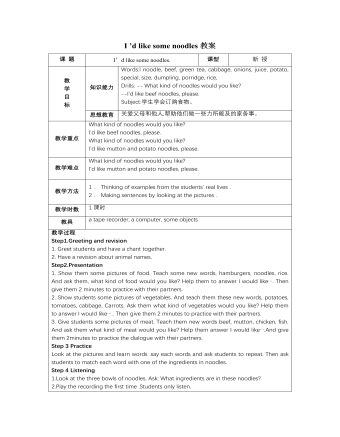
人教版新目标初中英语七年级下册I ’d like some noodles教案
教学过程Step 1: warming-up Sing a song---------“food and drink” Step 2: Revision1 Dictation2 Revise: What kind of noodles would you like?I’d like …What size bowl of noodles would you like?I’d like…Step 3: Presentation1 show pictures of food, ask students say the words.2 Students read the newspaper ad in 3a. Fill in blanks with words in the box. Then read the ad together, the teacher explains some difficult language points.3 Check the answers Step 4 PracticeAsk students to finish 3b in the same way according to 3a. Students read the short passage and fill in the blanks .At last, check the answers.Step 5 productionAsk students to write their own ad for dumplings, noodles, drinks, and other foods they know. Then ask students to read their partner’s ad. Then order food and drink from their partner.Step 6 Home workGroup work – make an ad about “food and drink”
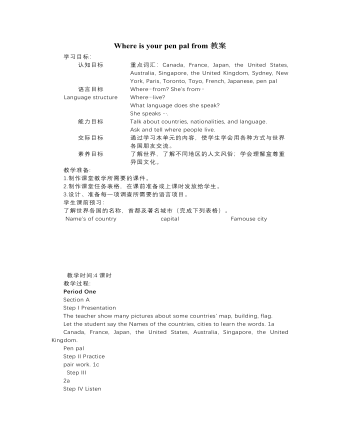
人教版新目标初中英语七年级下册Where is your pen pal from教案
2.1Match the country with the language.Step II Reading3a? let the students read the letter fast and answer the questions.? Let the students ask more questions about the letter as possible as the can.Step III Writing3b.Step IV. Pairwork2cStep V Listening2a, 2bStep V. HomeworkExercises book(1) P3Exercises book (2) P3Period FourStep I . Dictate the words and sentences in Unit1.Step II. Self-checkStep III. Check the answers for Exercises book in the unit.Step IV. Home workRevise and preparation for unit 2.教学反思:通过本单元的学习,学生基本可以谈论人们的国籍,居住城市及其所说的语言,通过书信方式去介绍自己并寻找笔友。但在涉及到国外的一些城市时,学生对这方面的知识相对欠缺,能介绍的城市并不多,也反应出学生课前预习不充分,这跟学生学习条件也有关,大多数学生无法通过网络获取所需信息。因此,在以后的教学中要多指导学生通过计算机网络获取信息,拓宽知识面。
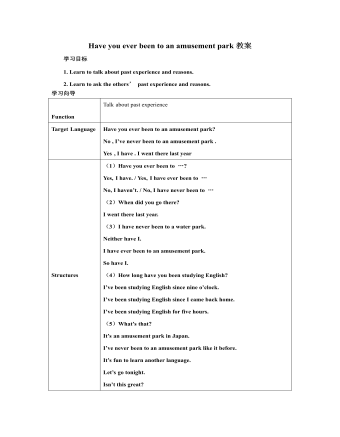
人教版新目标初中英语八年级下册Have you ever been to an amusement park教案
(1)Have you ever been to …? Yes, I have. / Yes, I have ever been to …No, I haven’t. / No, I have never been to …(2)When did you go there? I went there last year. (3)I have never been to a water park. Neither have I. I have ever been to an amusement park. So have I. (4)How long have you been studying English? I’ve been studying English since nine o’clock. I’ve been studying English since I came back home. I’ve been studying English for five hours. (5)What’s that? It’s an amusement park in Japan. I’ve never been to an amusement park like it before. It’s fun to learn another language. Let’s go tonight. Isn’t this great?space museum, amusement park, water park, South America, Peru, Holland, European culture, tour guide, flight attendant, musical instrument, more than, be from, get to, take lessons, neither, discover, graduate, change
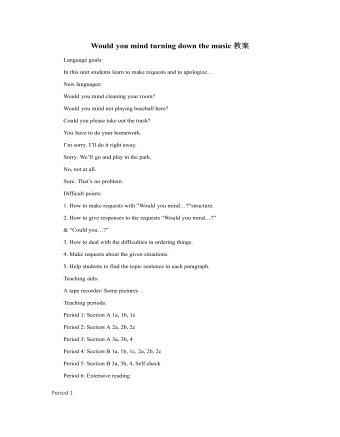
人教版新目标初中英语八年级下册Would you mind turning down the music教案
Step 4. Group work (4)1. Ask a pair of students to read the dialogue. Say, This activity provides speaking, listening and writing practice using the target language.2. Ask students to complete the work in groups.3. Check the answers with the whole class. 4. Explain some of the language points. Step 5. Word review (Self check 1)1. Ask students to read the words and the phrases given. 2. Fill in the blanks with proper forms of these words to complete the sentences. 3. Check the answers with the whole class. Homework:Do activity 2 on page 57 after class. Period 6Teaching aims: 1. Teach vocabulary words and the useful expressions. 2. Enable the students to learn etiquette in different culture. 3. Help the students learn how to behave politely in public places and in daily life. Teaching procedures:Step 1. RevisionHelp students to review the function of making requests through a free talk. Then lead them to the topic of etiquette. Explain the meaning of etiquette. Or, ask students to look it up in the dictionary. Step 2. Pre-reading (Section 1)1. Ask students to read the picture and make a list with their partner about how many rules of etiquette can be seen being broken.

人教版新目标初中英语九年级下册Rainy days make me sad教案
1. 教材分析本单元以how do things affect you?为话题, 从颜色、天气、音乐、广告、产品等方面谈论了外界事物如何影响人的心情。要求学生掌握表达某物或某事给人带来的感觉、看法或影响等。共设计了四个部分的内容:Section A 该部分有4个模块:第一模块围绕Which restaurant would you like to go to?这一话题展开思维(1a)、听力(1b)、口语(1c)训练;第二模块围绕How does music affect you? 进行听力(2a-2b)、口语训练(2c);第三模块继续围绕how do colors in the restaurant affect you这一话题展开训练,训练形式为阅读和问题体验(3a)和小组活动(3b);第四模块仍就How do things affect you这一话题以调查的形式展开讨论。Section B该部分有4个模块:第一模块围绕产品广告对人们的影响这一话题以“配对”(1a)与“列举”(1b)两种形式展开训练;第二模块继续围绕How do things affect you? 进行听力(2a-2b)、口语对话训练(2c);第三模块围绕“Advertising”这一话题展开阅读(3a-3b)和写作(3c)训练;第四模块围绕How posters affect you这一话题以口语训练形式展开小组活动。

